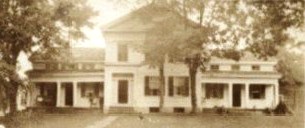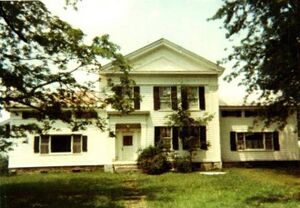Difference between revisions of "The Jacob Sholtes House"
m (1 revision imported) |
m (1 revision imported) |
(No difference)
| |
Latest revision as of 18:04, May 14, 2022
- 1851 Jacob Sholtes, after the early death of two earlier wives, married Angelica Schell. Jacob immediately built her a new house on their Rock Road farm; it was built next to the old one. The house was beautiful in craftsmanship. Mrs. Euretha W. Stapleton, former Town of Berne Historian, described the house as extravagant. She said that Angelica Schell enjoyed the good life. Mrs. Stapleton reported that after the new house was constructed the old house was torn down. Looking at the house it seems more likely that the old house is one of the wings.
- The Jacob Sholtes Farm was in the Sholtes / Shultes family for 175 years.
- 19?? the front porches were removed from the two wings and picture windows replaced the doors and side by side windows.
- May 2007 Theresa Consentino-Tommell and her husband Nick Tommell Jr bought The Jacob Sholtes House.
Depending on date, barn could have been built by German or Dutchman
To the Editor,
I was pleased to read the article in the July 22 edition about the grant for preserving the Dutch barn on Rock Road in Knox (not Berne), but surprised it said nothing about who built it 200 years ago.
If the barn was built about the turn of the 18th Century, the land was being farmed by.Johan Jacob Shultes. Jacob, as he was generally called, had been an ensign in the Revolutionary War. In 1786, he married Maria Fischer, daughter of Peter Fisher, who lived nearby on Stranahan Lane on the property that later became known as the Thomas Wood Farm.
A 1787 Van Rensselaer survey map of what are now the towns of Berne and Knox shows Johan Jacob Shultes leasing the farm on "Rock Road. The irregular shape of the lot indicates that the land was originally settled by a squatter long before Stephen Van Rensselaer had the land surveyed and began issuing leases after the Revolutionary War.
The main part of the current farmhouse was built in 1852 by Jacob's grandson, Jacob, for his third bride, Angelica Schell. The farm remained in the Shultes family until 1958.
The elder Jacob was the son of Mathias Shultes who was born about 1740. Mathias came to the Beaver Dam, as Berne was then called, in about 1751 with his step-father, Jacob Weidman, and his mother, the former Elisabetha Dietz. Elisabetha was the young widow of an unknown Shultes when she married Jacob Weidman in 1743 in the Zion Lutheran Church in Loonenburg (now Athens), Greene County. Since Elisabetha already had younger brothers living in the Beaver Dam area before they arrived, Weidman could not have been the first settler that earlier histories of Berne had assumed.
It was probably in the early 1740's that Elisabetha Dietz emigrated from Vielbach, Germany with her widowed mother and teenaged siblings. The Dietz family was likely accompanied by the family of her first husband, since they would not have traveled alone. A Schuldes family lived near the Dietz family in Germany and also settled in Greene County. This was undoubtedly the family 6f her husband.
The point of this brief history is to point out that, if it is correct that the barn on Rock Road was built 200 years ago, it was built in the Dutch style by a German, not a Dutchman. However, if the barn was built before 1787, it could have been built by a Dutchman. So it depends on the accuracy of the dating of the barn.
Harold Miller
Mexico
Editor's note: Harold Miller is a fifth great-grandson of Mathias Shultes. He was born and raised in East Berne and is now retired and lives in Mexico where he researches the families and history of Berne. His articles have been published in The Altamont Enterprise, the Greater Oneonta Historical „ Society newsletter, the Historical Footnotes Bulletin of the Stonington, Conn. Historical Society, and on the Berne Historical Project web site, www.Bernehistory.org.
- Altamont Enterprise - August 5, 2004



